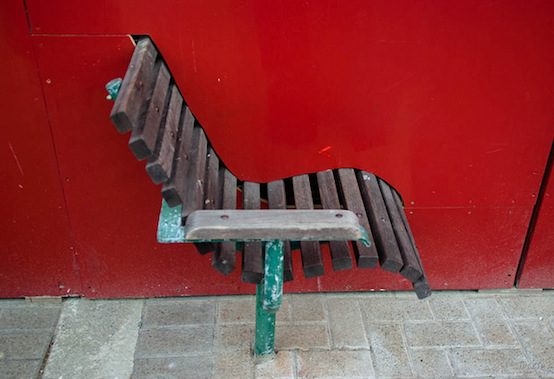Starving for Communal Spaces

A man walks into a business establishment and pays a small sum of money for the use of their premises. He’s slightly furtive about it, and the proprietor would probably deny the nature of the service provided, but the gentleman is seeking companionship, and doesn’t have anywhere else to go.
I’m not describing the kind of tawdry hotel that rents its rooms by the hour, but a coffee shop or a fast food outlet. And the gentleman in question might be an elderly Korean man, one of the group that got ejected from a McDonald’s in New York City for repeatedly lingering too long over their coffees.
The retirees weren’t really there for the McCafé lattes, of course. I’ve pulled the same trick, scanning a Starbucks menu for the cheapest drink, picking out a chair, and pulling out a novel. The drink is really just a ticket, that, displayed properly, entitles the bearer to one seat and a bit of table space for up to two hours.
It’s quite reasonable that the baristas would rather sell me coffee, not lease me real estate. After all, if someone behaved this way in a restaurant, pulling out a laptop and settling in after their meal, they’d be behaving badly. But I’m not sure who we’re supposed to patronize for communal space instead.
The Korean men chose to come to the McDonalds, instead of a nearby senior center, perhaps to avoid being cordoned off from the pulse of the city. A coffee shop or a casual restaurant is a place to spend time with friends or to just be alone among people. But, if the stores are strict and you’re not old enough to retreat to the retirement center, options can be limited.
If you’re in New York City, or anywhere else inspired by Bloomberg’s pedestrian plazas, you can sit outside if it’s warm. You could try a library, if the ones in your area don’t follow a pretty strict, business hours schedule, but you’ll still have trouble finding a place to talk.
And before you head out to a public park or handy place near the streets, keep in mind that urban architects, in an effort to reduce loitering, have been removing benches or revamping them to be deliberately anti-ergonomic, to keep pedestrians from overstaying their welcome.
A Robert Moses-esque approach to public space limits everyone’s ability to live in community. Americans now face an average commute of twenty-five minutes, so we’re unlikely to be able to head out of the city to meet up. After all, our friends and colleagues may be living 25 minutes in the opposite direction. The more onerous the trip, the less likely our friends are to drop in serendipitously.
Without the opportunity for casual encounters, it’s hard for a friendship to begin or deepen. Without public spaces that serve a neighborhood, it’s hard to get to know the people around us and be more responsive to their needs.
The onus isn’t on any particular business to play host to people seeking community, but on us to build or patronize the resources we need. Even if coffee shops become more welcoming (or if London’s pay-per-minute cafes catch on), something is lost when our communal spaces are intensely commercial.
When we build libraries or plazas, we’re making a statement about what we value as a city. Relying on consumers to purchase time in public spaces for themselves suggests it’s a discretionary purchase, not a need as basic and human as shelter.
It would be a shame to look back on Robert Putnam’s Bowling Alone and feel envious that the lonely people he describes still had somewhere to loiter.